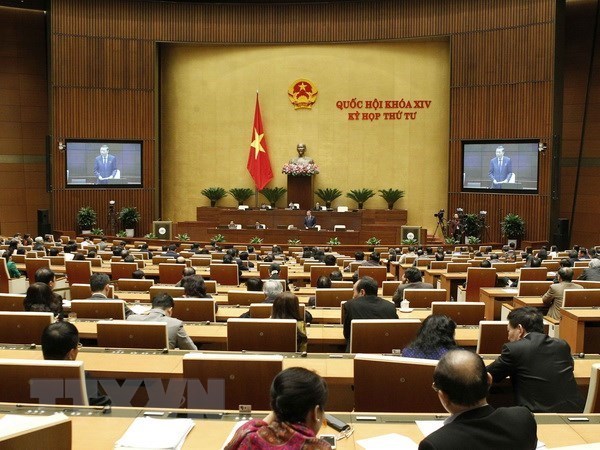Nine laws become effective on 1 July
Nine new laws became effective on July 1, 2018, including the Law on Public Debt Management; Law on amendments and supplementations to some articles of the Law on Overseas Representative Missions of the Socialist Republic of Viet Nam.
 |
| A view of the fourth session of the 14th National Assembly in late 2017. The Law on Public Debt Management was among the laws adopted at this fourth session (Photo: VNA) |
The others are the Law on Guard Force; Law on Management and Use of Weapons, Explosives and Supporting Tools; Law on State Compensation Liability; Law on Technology Transfer; Irrigation Law; Railway Law; and Law on Access to Information.
The Law on Public Dept Management comprises of 10 chapters, 63 articles. One of the important new points of the law is that the Ministry of Finance is now responsible for issues related to ODA and foreign soft loans instead of the Ministry of Planning and Investment.
A new concept of “public debt limitation” is introduced for the first time in the law in order to raise alarm when public debt is about to hit the ceiling level. The level will be decided by the National Assembly for each period.
Meanwhile, the Law on amendments and supplementations to some articles of the Law on Overseas Representative Missions of the Socialist Republic of Vietnam makes changes to 11 out of the total 36 articles of the current law. It adjusts and supplements the stipulation on the consular duties of representative missions. The law also regulates that the National Assembly’s Standing Committee shall approve proposals on appointment and dismiss of ambassadors.
The Law on Guard Force has 6 chapters and 33 articles, regulating measures to protect high-ranking officials of the Party, State and the Vietnam Fatherland Front.
It also specifies four situations in which a guard can open fire.
With 8 chapters and 76 articles, the Law on Management, Use of Weapons, Explosives and Supporting Tools adds a stipulation that coast guard force, cipher security force and investigators of the Supreme People’s Procuracy will be equipped with weapons.
The revised Law on State Compensation Liability, with 9 chapters and 78 articles, aims to ensure the compensations is undertaken in a prompt and effective manner, and address limitations and obstacles in the work in the past time.
The Law on Technology Transfer has 60 articles and 6 chapters, with addition regulations on policies to encourage businesses to apply and renovate technology, along with measures to develop science and technology market.
The Irrigation Law clarifies principles in investment in construction of irrigation works, in which the State will only build major irrigation works of special significance, projects facing difficulties in mobilising social resources, projects that serve both irrigation and national defence-security and natural disaster control; works in disadvantaged areas including areas inhabited by ethnic minority communities, mountainous areas, islands, especially poor areas and localities hard hit by climate change.
The Railway Law has 10 chapters and 87 articles, 2 chapters more than the 2005 version but a reduction of 27 articles. The law also has new regulations on high-speed railway.
The Law on Access to Information has 5 chapters and 37 articles, stipulating the exercise of citizens’ rights to access information as well as principles, procedures to implement the rights and the obligations of State agencies in ensuring the rights.
The law regulates that foreigners residing in Viet Nam can only be requested to provide information directly related to their rights and responsibilities.
(Source: VNA)